The impact of equity in FDI firms on accountants' loyalty: Application of equity theory and creative application in economics sociological knowledge
This research was conducted to investigate the impact of equity in foreign direct investment (FDI)
firms on accountants' loyalty in Thanglong industrial park, Hanoi, Vietnam based on Equity theory.
Data were collected through a survey with 150 accountants from Thanglong industrial park. With this
data, we have used Cronbach's Alpha, Exploratory Factor Analysis (EFA) and correlation analysis to
determine the effects of the independent variables on the dependent variable, i.e. the loyalty of
accountants. The results show that the equity in FDI firms had positive relationships with the loyalty
of accountants in Thanglong industrial park. Based on this finding, this paper gives several
recommendations for improvement the loyalty of accountants in Thanglong industrial park
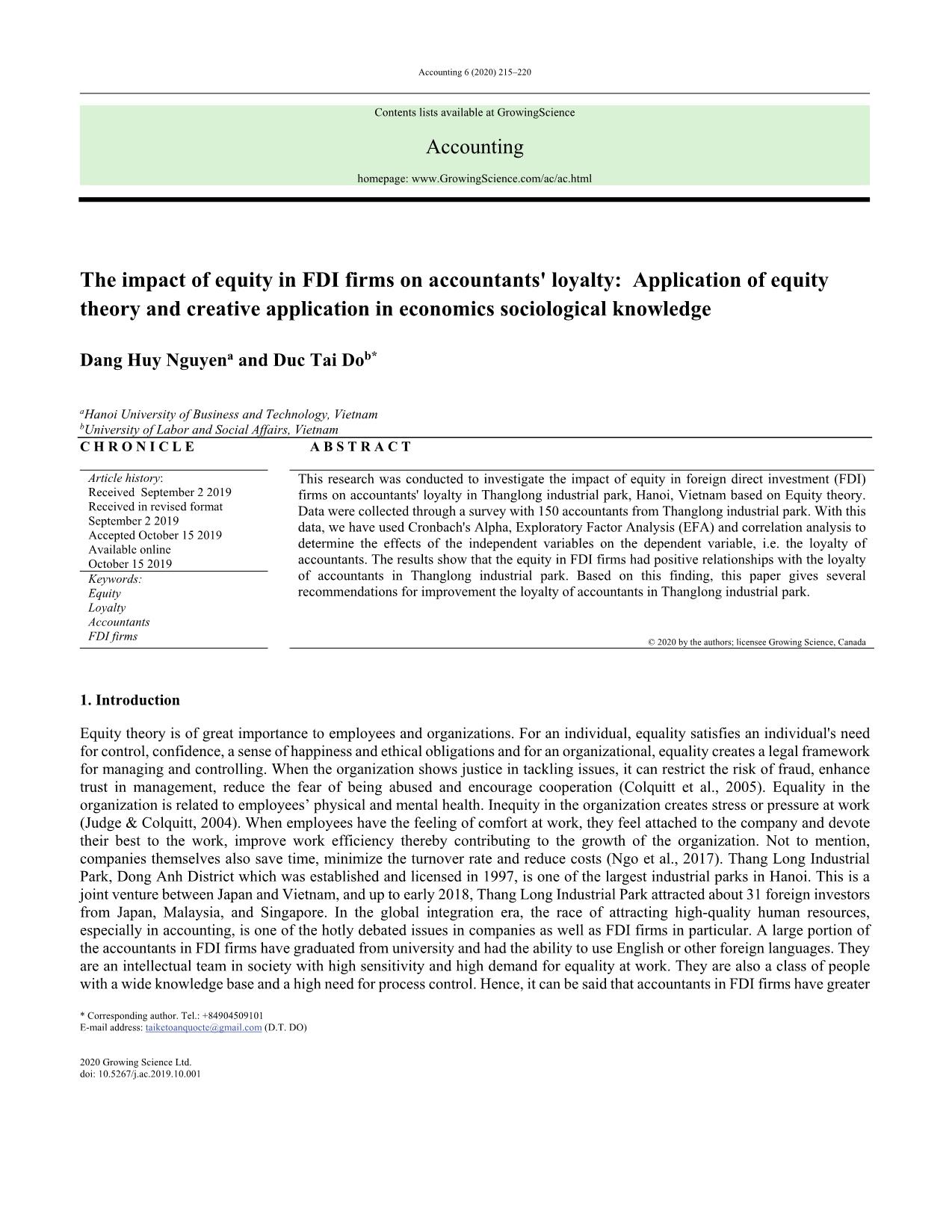
Trang 1
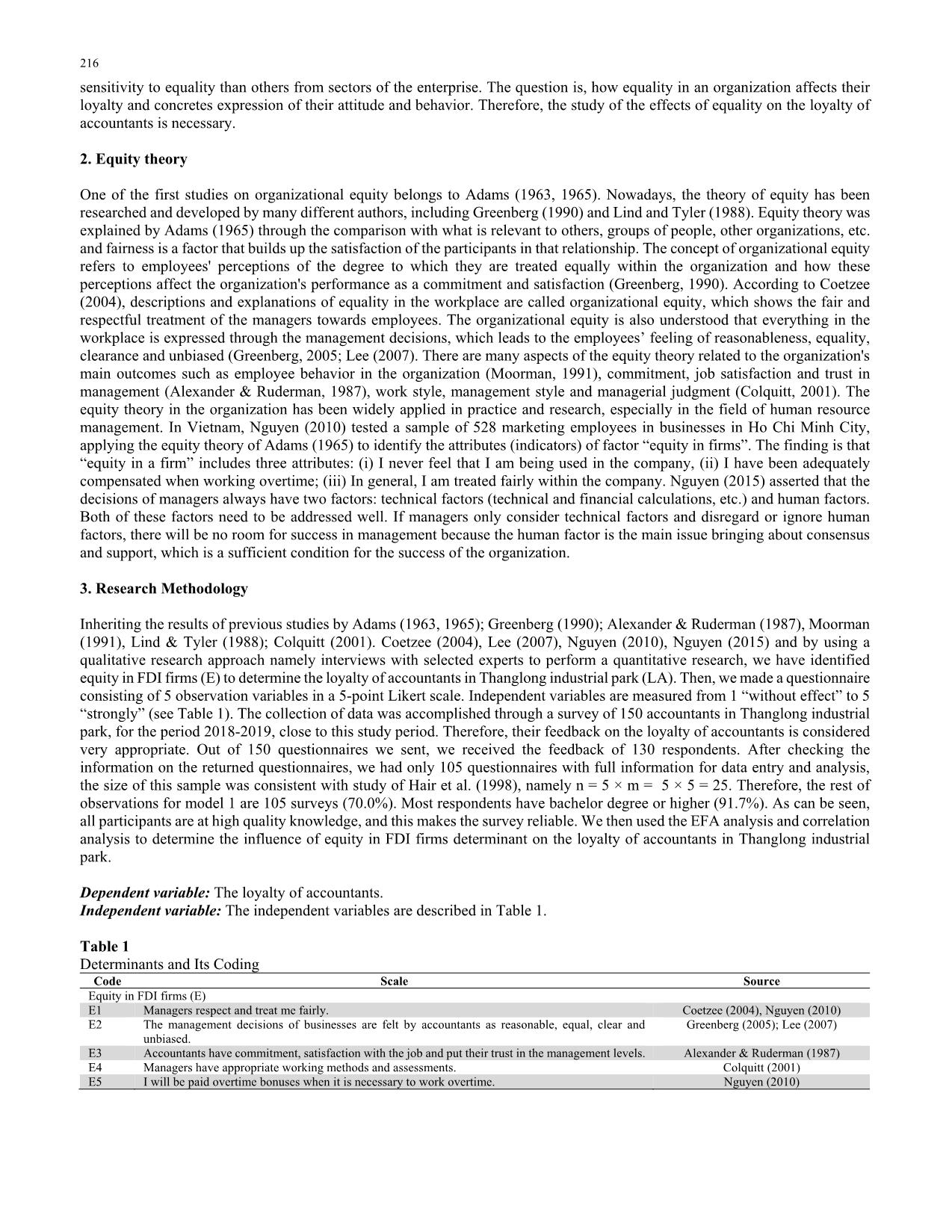
Trang 2
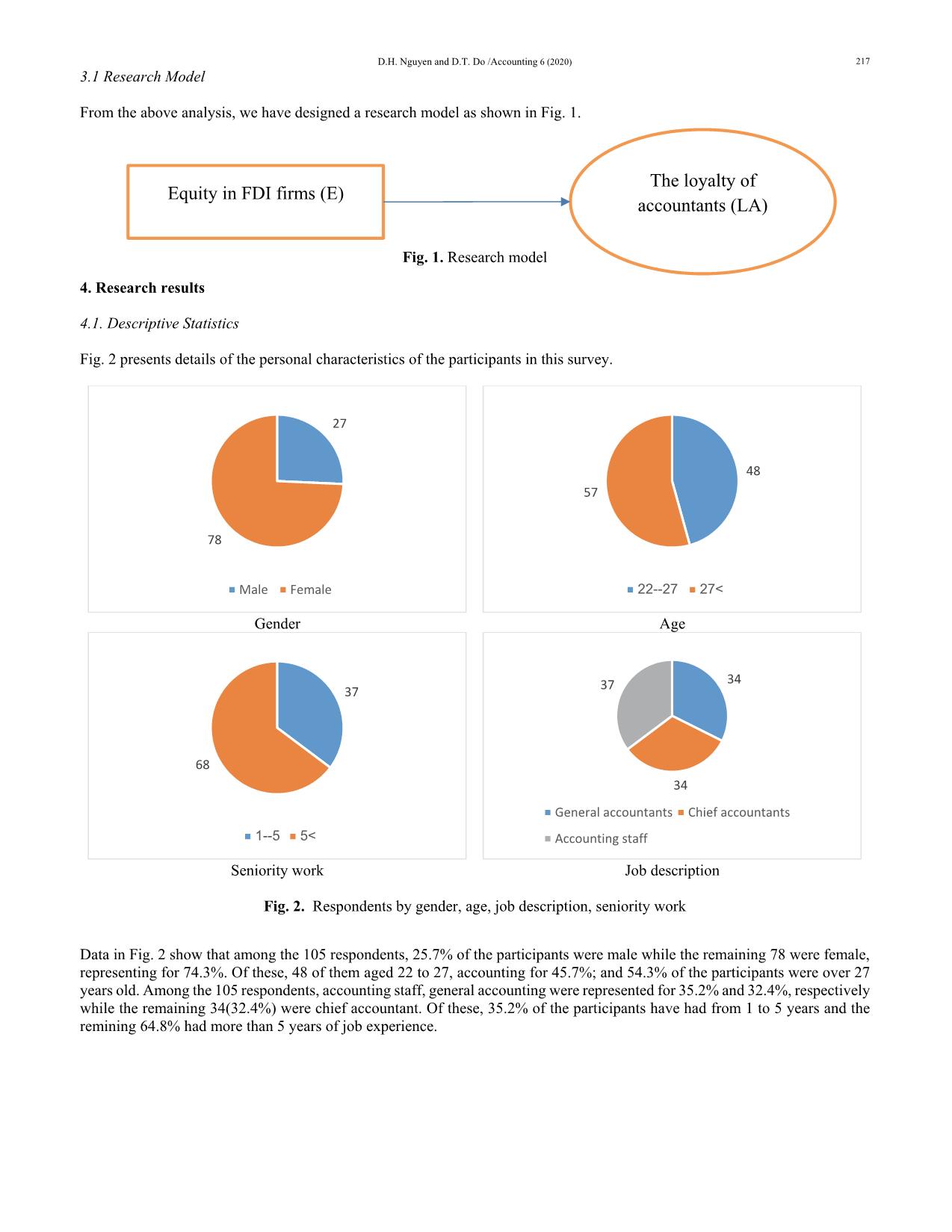
Trang 3
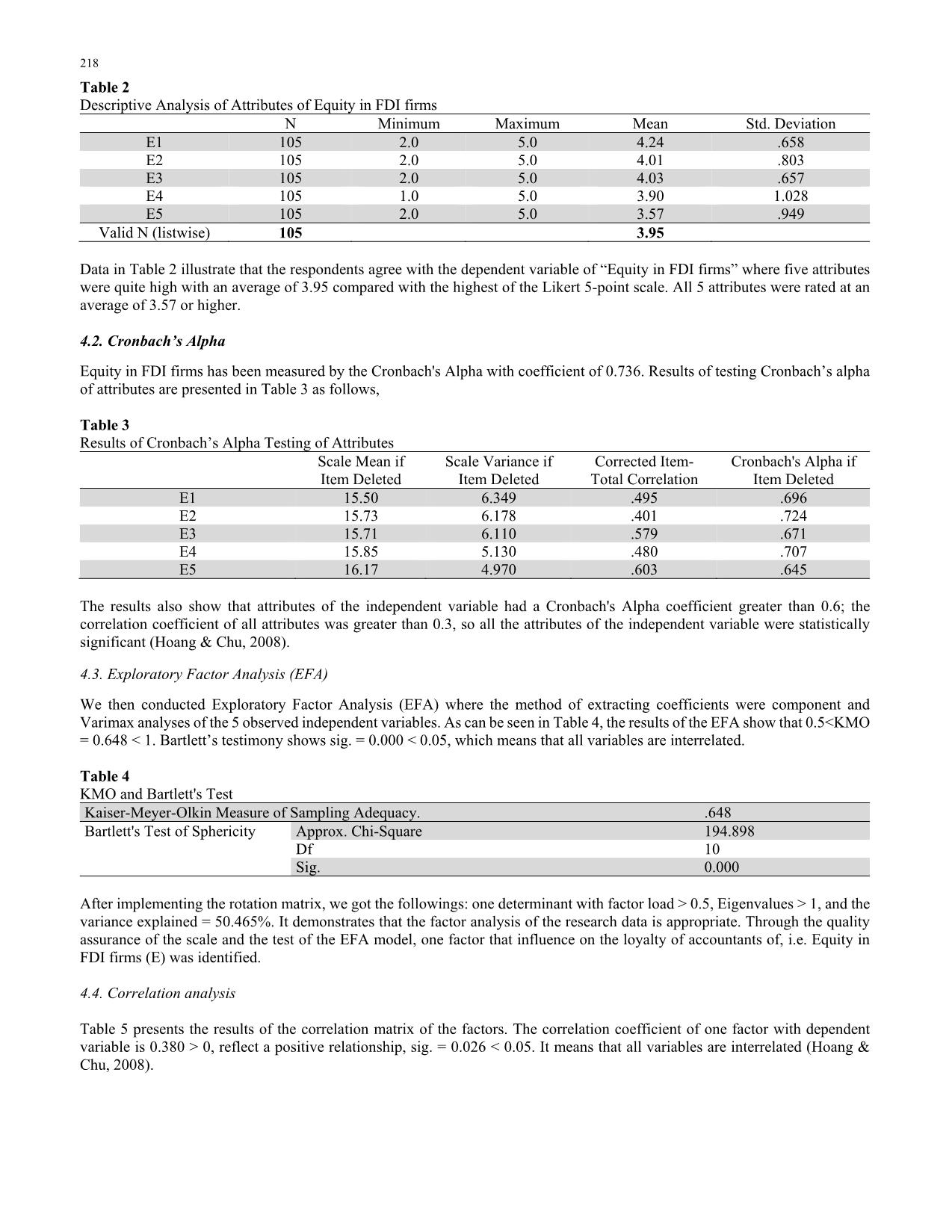
Trang 4
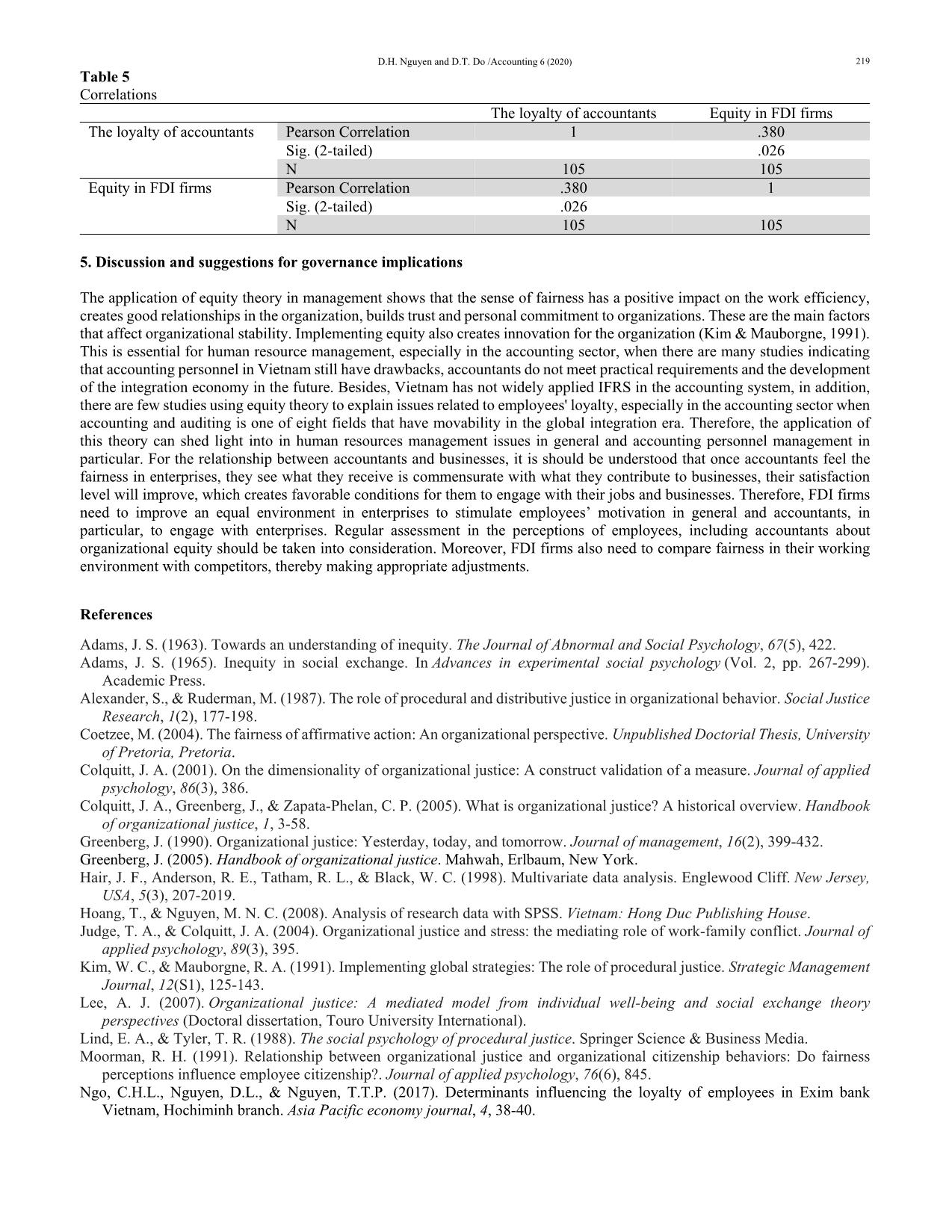
Trang 5
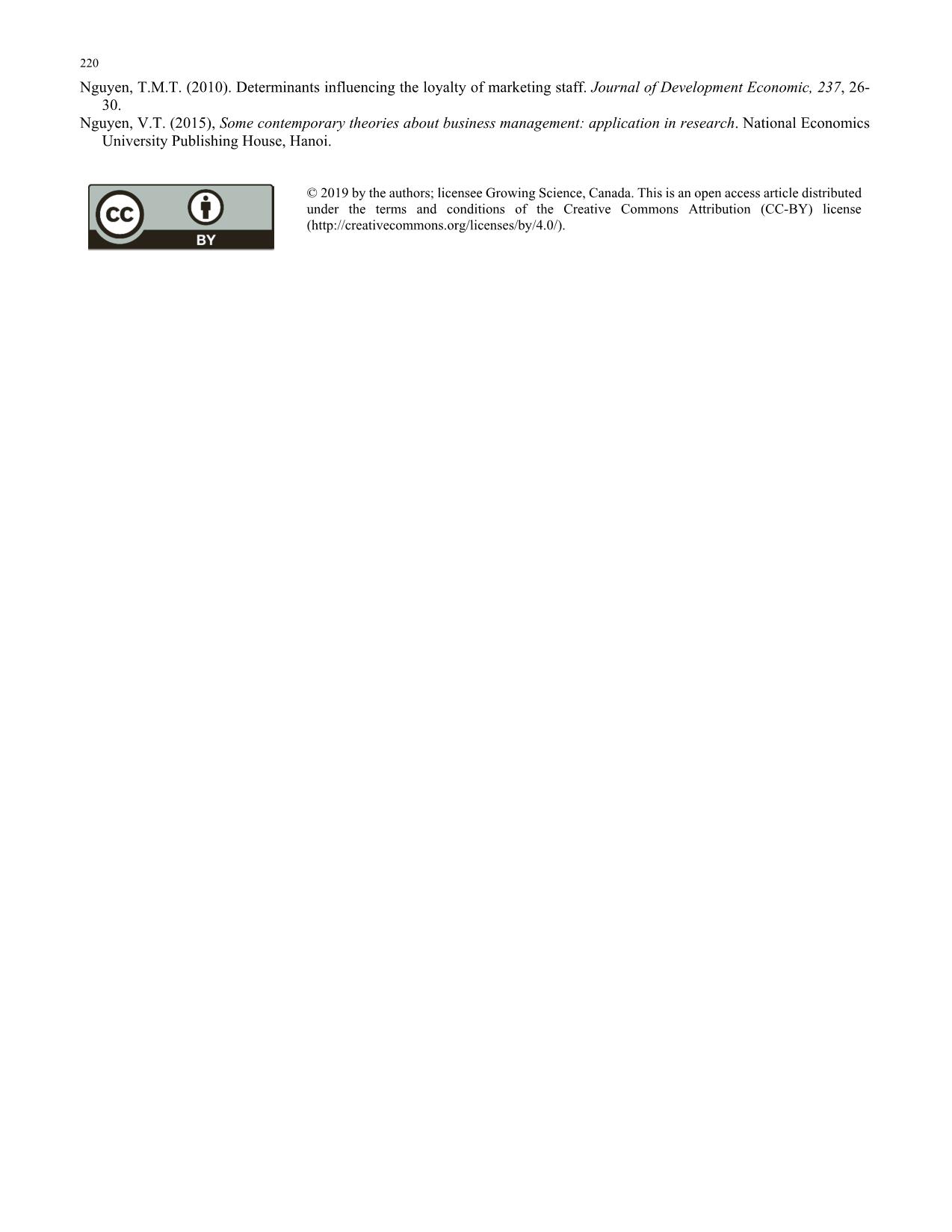
Trang 6
Tóm tắt nội dung tài liệu: The impact of equity in FDI firms on accountants' loyalty: Application of equity theory and creative application in economics sociological knowledge
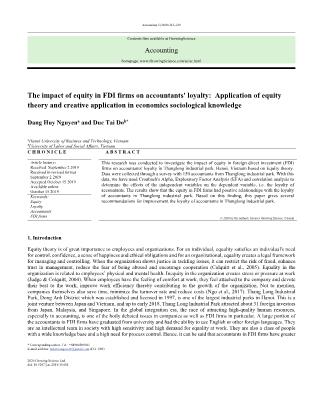
the hotly debated issues in companies as well as FDI firms in particular. A large portion of the accountants in FDI firms have graduated from university and had the ability to use English or other foreign languages. They are an intellectual team in society with high sensitivity and high demand for equality at work. They are also a class of people with a wide knowledge base and a high need for process control. Hence, it can be said that accountants in FDI firms have greater 216 sensitivity to equality than others from sectors of the enterprise. The question is, how equality in an organization affects their loyalty and concretes expression of their attitude and behavior. Therefore, the study of the effects of equality on the loyalty of accountants is necessary. 2. Equity theory One of the first studies on organizational equity belongs to Adams (1963, 1965). Nowadays, the theory of equity has been researched and developed by many different authors, including Greenberg (1990) and Lind and Tyler (1988). Equity theory was explained by Adams (1965) through the comparison with what is relevant to others, groups of people, other organizations, etc. and fairness is a factor that builds up the satisfaction of the participants in that relationship. The concept of organizational equity refers to employees' perceptions of the degree to which they are treated equally within the organization and how these perceptions affect the organization's performance as a commitment and satisfaction (Greenberg, 1990). According to Coetzee (2004), descriptions and explanations of equality in the workplace are called organizational equity, which shows the fair and respectful treatment of the managers towards employees. The organizational equity is also understood that everything in the workplace is expressed through the management decisions, which leads to the employees’ feeling of reasonableness, equality, clearance and unbiased (Greenberg, 2005; Lee (2007). There are many aspects of the equity theory related to the organization's main outcomes such as employee behavior in the organization (Moorman, 1991), commitment, job satisfaction and trust in management (Alexander & Ruderman, 1987), work style, management style and managerial judgment (Colquitt, 2001). The equity theory in the organization has been widely applied in practice and research, especially in the field of human resource management. In Vietnam, Nguyen (2010) tested a sample of 528 marketing employees in businesses in Ho Chi Minh City, applying the equity theory of Adams (1965) to identify the attributes (indicators) of factor “equity in firms”. The finding is that “equity in a firm” includes three attributes: (i) I never feel that I am being used in the company, (ii) I have been adequately compensated when working overtime; (iii) In general, I am treated fairly within the company. Nguyen (2015) asserted that the decisions of managers always have two factors: technical factors (technical and financial calculations, etc.) and human factors. Both of these factors need to be addressed well. If managers only consider technical factors and disregard or ignore human factors, there will be no room for success in management because the human factor is the main issue bringing about consensus and support, which is a sufficient condition for the success of the organization. 3. Research Methodology Inheriting the results of previous studies by Adams (1963, 1965); Greenberg (1990); Alexander & Ruderman (1987), Moorman (1991), Lind & Tyler (1988); Colquitt (2001). Coetzee (2004), Lee (2007), Nguyen (2010), Nguyen (2015) and by using a qualitative research approach namely interviews with selected experts to perform a quantitative research, we have identified equity in FDI firms (E) to determine the loyalty of accountants in Thanglong industrial park (LA). Then, we made a questionnaire consisting of 5 observation variables in a 5-point Likert scale. Independent variables are measured from 1 “without effect” to 5 “strongly” (see Table 1). The collection of data was accomplished through a survey of 150 accountants in Thanglong industrial park, for the period 2018-2019, close to this study period. Therefore, their feedback on the loyalty of accountants is considered very appropriate. Out of 150 questionnaires we sent, we received the feedback of 130 respondents. After checking the information on the returned questionnaires, we had only 105 questionnaires with full information for data entry and analysis, the size of this sample was consistent with study of Hair et al. (1998), namely n = 5 × m = 5 × 5 = 25. Therefore, the rest of observations for model 1 are 105 surveys (70.0%). Most respondents have bachelor degree or higher (91.7%). As can be seen, all participants are at high quality knowledge, and this makes the survey reliable. We then used the EFA analysis and correlation analysis to determine the influence of equity in FDI firms determinant on the loyalty of accountants in Thanglong industrial park. Dependent variable: The loyalty of accountants. Independent variable: The independent variables are described in Table 1. Table 1 Determinants and Its Coding Code Scale Source Equity in FDI firms (E) E1 Managers respect and treat me fairly. Coetzee (2004), Nguyen (2010) E2 The management decisions of businesses are felt by accountants as reasonable, equal, clear and unbiased. Greenberg (2005); Lee (2007) E3 Accountants have commitment, satisfaction with the job and put their trust in the management levels. Alexander & Ruderman (1987) E4 Managers have appropriate working methods and assessments. Colquitt (2001) E5 I will be paid overtime bonuses when it is necessary to work overtime. Nguyen (2010) D.H. Nguyen and D.T. Do /Accounting 6 (2020) 217 3.1 Research Model From the above analysis, we have designed a research model as shown in Fig. 1. Fig. 1. Research model 4. Research results 4.1. Descriptive Statistics Fig. 2 presents details of the personal characteristics of the participants in this survey. Gender Age Seniority work Job description Fig. 2. Respondents by gender, age, job description, seniority work Data in Fig. 2 show that among the 105 respondents, 25.7% of the participants were male while the remaining 78 were female, representing for 74.3%. Of these, 48 of them aged 22 to 27, accounting for 45.7%; and 54.3% of the participants were over 27 years old. Among the 105 respondents, accounting staff, general accounting were represented for 35.2% and 32.4%, respectively while the remaining 34(32.4%) were chief accountant. Of these, 35.2% of the participants have had from 1 to 5 years and the remining 64.8% had more than 5 years of job experience. 27 78 Male Female 48 57 22--27 <27 37 68 1--5 <5 34 34 37 General accountants Chief accountants Accounting staff Equity in FDI firms (E) The loyalty of accountants (LA) 218 Table 2 Descriptive Analysis of Attributes of Equity in FDI firms N Minimum Maximum Mean Std. Deviation E1 105 2.0 5.0 4.24 .658 E2 105 2.0 5.0 4.01 .803 E3 105 2.0 5.0 4.03 .657 E4 105 1.0 5.0 3.90 1.028 E5 105 2.0 5.0 3.57 .949 Valid N (listwise) 105 3.95 Data in Table 2 illustrate that the respondents agree with the dependent variable of “Equity in FDI firms” where five attributes were quite high with an average of 3.95 compared with the highest of the Likert 5-point scale. All 5 attributes were rated at an average of 3.57 or higher. 4.2. Cronbach’s Alpha Equity in FDI firms has been measured by the Cronbach's Alpha with coefficient of 0.736. Results of testing Cronbach’s alpha of attributes are presented in Table 3 as follows, Table 3 Results of Cronbach’s Alpha Testing of Attributes Scale Mean if Item Deleted Scale Variance if Item Deleted Corrected Item- Total Correlation Cronbach's Alpha if Item Deleted E1 15.50 6.349 .495 .696 E2 15.73 6.178 .401 .724 E3 15.71 6.110 .579 .671 E4 15.85 5.130 .480 .707 E5 16.17 4.970 .603 .645 The results also show that attributes of the independent variable had a Cronbach's Alpha coefficient greater than 0.6; the correlation coefficient of all attributes was greater than 0.3, so all the attributes of the independent variable were statistically significant (Hoang & Chu, 2008). 4.3. Exploratory Factor Analysis (EFA) We then conducted Exploratory Factor Analysis (EFA) where the method of extracting coefficients were component and Varimax analyses of the 5 observed independent variables. As can be seen in Table 4, the results of the EFA show that 0.5<KMO = 0.648 < 1. Bartlett’s testimony shows sig. = 0.000 < 0.05, which means that all variables are interrelated. Table 4 KMO and Bartlett's Test Kaiser-Meyer-Olkin Measure of Sampling Adequacy. .648 Bartlett's Test of Sphericity Approx. Chi-Square 194.898 Df 10 Sig. 0.000 After implementing the rotation matrix, we got the followings: one determinant with factor load > 0.5, Eigenvalues > 1, and the variance explained = 50.465%. It demonstrates that the factor analysis of the research data is appropriate. Through the quality assurance of the scale and the test of the EFA model, one factor that influence on the loyalty of accountants of, i.e. Equity in FDI firms (E) was identified. 4.4. Correlation analysis Table 5 presents the results of the correlation matrix of the factors. The correlation coefficient of one factor with dependent variable is 0.380 > 0, reflect a positive relationship, sig. = 0.026 < 0.05. It means that all variables are interrelated (Hoang & Chu, 2008). D.H. Nguyen and D.T. Do /Accounting 6 (2020) 219 Table 5 Correlations The loyalty of accountants Equity in FDI firms The loyalty of accountants Pearson Correlation 1 .380 Sig. (2-tailed) .026 N 105 105 Equity in FDI firms Pearson Correlation .380 1 Sig. (2-tailed) .026 N 105 105 5. Discussion and suggestions for governance implications The application of equity theory in management shows that the sense of fairness has a positive impact on the work efficiency, creates good relationships in the organization, builds trust and personal commitment to organizations. These are the main factors that affect organizational stability. Implementing equity also creates innovation for the organization (Kim & Mauborgne, 1991). This is essential for human resource management, especially in the accounting sector, when there are many studies indicating that accounting personnel in Vietnam still have drawbacks, accountants do not meet practical requirements and the development of the integration economy in the future. Besides, Vietnam has not widely applied IFRS in the accounting system, in addition, there are few studies using equity theory to explain issues related to employees' loyalty, especially in the accounting sector when accounting and auditing is one of eight fields that have movability in the global integration era. Therefore, the application of this theory can shed light into in human resources management issues in general and accounting personnel management in particular. For the relationship between accountants and businesses, it is should be understood that once accountants feel the fairness in enterprises, they see what they receive is commensurate with what they contribute to businesses, their satisfaction level will improve, which creates favorable conditions for them to engage with their jobs and businesses. Therefore, FDI firms need to improve an equal environment in enterprises to stimulate employees’ motivation in general and accountants, in particular, to engage with enterprises. Regular assessment in the perceptions of employees, including accountants about organizational equity should be taken into consideration. Moreover, FDI firms also need to compare fairness in their working environment with competitors, thereby making appropriate adjustments. References Adams, J. S. (1963). Towards an understanding of inequity. The Journal of Abnormal and Social Psychology, 67(5), 422. Adams, J. S. (1965). Inequity in social exchange. In Advances in experimental social psychology (Vol. 2, pp. 267-299). Academic Press. Alexander, S., & Ruderman, M. (1987). The role of procedural and distributive justice in organizational behavior. Social Justice Research, 1(2), 177-198. Coetzee, M. (2004). The fairness of affirmative action: An organizational perspective. Unpublished Doctorial Thesis, University of Pretoria, Pretoria. Colquitt, J. A. (2001). On the dimensionality of organizational justice: A construct validation of a measure. Journal of applied psychology, 86(3), 386. Colquitt, J. A., Greenberg, J., & Zapata-Phelan, C. P. (2005). What is organizational justice? A historical overview. Handbook of organizational justice, 1, 3-58. Greenberg, J. (1990). Organizational justice: Yesterday, today, and tomorrow. Journal of management, 16(2), 399-432. Greenberg, J. (2005). Handbook of organizational justice. Mahwah, Erlbaum, New York. Hair, J. F., Anderson, R. E., Tatham, R. L., & Black, W. C. (1998). Multivariate data analysis. Englewood Cliff. New Jersey, USA, 5(3), 207-2019. Hoang, T., & Nguyen, M. N. C. (2008). Analysis of research data with SPSS. Vietnam: Hong Duc Publishing House. Judge, T. A., & Colquitt, J. A. (2004). Organizational justice and stress: the mediating role of work-family conflict. Journal of applied psychology, 89(3), 395. Kim, W. C., & Mauborgne, R. A. (1991). Implementing global strategies: The role of procedural justice. Strategic Management Journal, 12(S1), 125-143. Lee, A. J. (2007). Organizational justice: A mediated model from individual well-being and social exchange theory perspectives (Doctoral dissertation, Touro University International). Lind, E. A., & Tyler, T. R. (1988). The social psychology of procedural justice. Springer Science & Business Media. Moorman, R. H. (1991). Relationship between organizational justice and organizational citizenship behaviors: Do fairness perceptions influence employee citizenship?. Journal of applied psychology, 76(6), 845. Ngo, C.H.L., Nguyen, D.L., & Nguyen, T.T.P. (2017). Determinants influencing the loyalty of employees in Exim bank Vietnam, Hochiminh branch. Asia Pacific economy journal, 4, 38-40. 220 Nguyen, T.M.T. (2010). Determinants influencing the loyalty of marketing staff. Journal of Development Economic, 237, 26- 30. Nguyen, V.T. (2015), Some contemporary theories about business management: application in research. National Economics University Publishing House, Hanoi. © 2019 by the authors; licensee Growing Science, Canada. This is an open access article distributed under the terms and conditions of the Creative Commons Attribution (CC-BY) license (
File đính kèm:
 the_impact_of_equity_in_fdi_firms_on_accountants_loyalty_app.pdf
the_impact_of_equity_in_fdi_firms_on_accountants_loyalty_app.pdf

